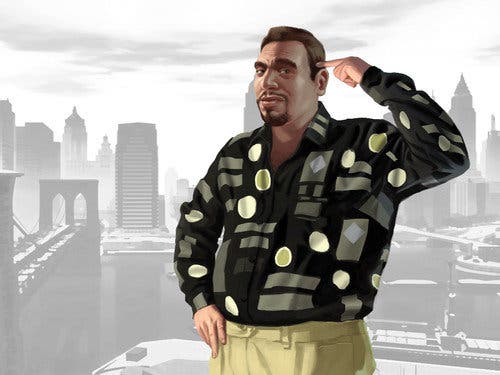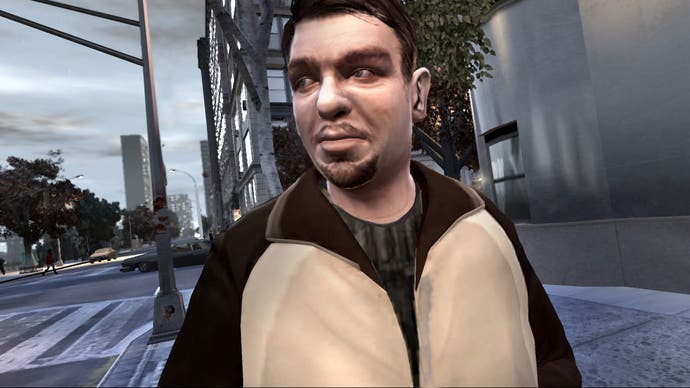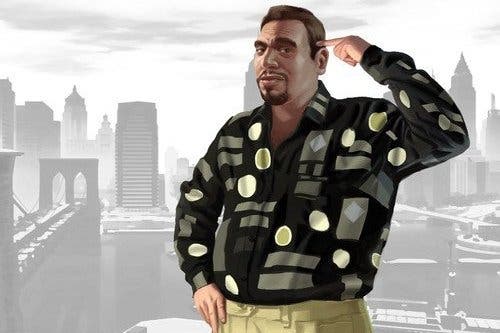Bowling for Liberty
From the archive: Why GTA4's Roman Bellic is one of the greatest video game characters of all time.
Every Sunday we bring you a feature selected from our archive. This week, to celebrate the imminent release of Grand Theft Auto 5 on PS4 and Xbox One, we bring you Dan Whitehead's paean to an unloved GTA4 character. This article was originally published in November 2011.
WARNING: This article spoils the endings for both GTA4 and Red Dead Redemption.
If you pay attention to the internet, you'd be forgiven for thinking that GTA4, Rockstar's rich and deep urban elegy, was nothing but a virtual cellphone simulator with a bowling minigame attached. No sooner had the teaser trailer for GTA5 dropped online than comment threads filled up with hilariously facetious questions asking if the new game would revolve around being pestered to take your cousin to the ten pin alley.
The cousin, of course, is Roman Bellic, the distorted sad sack reflection of GTA4 protagonist Niko. Thanks to the game's cellphone, not only could you call characters up to arrange weapon drops or vehicle deliveries, they could also call you up and ask to hang out. Getting drunk, watching a virtual Ricky Gervais performance, grabbing a meal, hitting a strip club or - yes - going bowling were all valid entertainment options within Liberty City's squalid boundaries.
No character abused that feature more than Roman. He'd call up at the most inconvenient times, with inane requests. "Hey cousin, it's me" he'd bleat. "Want to go bowling?" And we'd grit our teeth and get back to finding the perfect stunt spot, evading the cops or whatever wacky scrape we'd managed to get Niko embroiled in. It soon became a meme: GTA4 was the game where your idiot cousin wouldn't shut up about going bowling.

But in the inevitable online rush to be the first with a snarky comment or too-cool-to-care putdown, everyone was missing the point. Roman is supposed to be annoying.
It's notable that few people complained about any of the other friends that Niko could hang with. Brucie was funny and over the top, and he'd take you for helicopter rides or racing sports cars. Brucie was kind of a dick, but he was also cool to be around. Packie was lairy and fun, the ideal drinking partner with an attractive sister. Little Jacob was all weed and guns.
Roman? He was the opposite; a schlubby awkward loser, unable to hide his desperate need to hang with the popular people. And it's precisely because of his off-putting neediness, his pitiful hopelessness, that out of all the outlandish characters in GTA4 he's by far the best.
Last year, Games Radar named him one of the worst gaming sidekicks of all time. "Without Roman's constant pestering to embarrass yourself at pool and talk about women you're not having sex with, Grand Theft Auto 4 would degenerate into a hyper-violent, amoral fantasy," they said. For me, that's exactly what makes him so vital.
As gamers we're conditioned to have a very mechanistic view of plot and character. "What do I get out of this?" is the unspoken question whenever we engage an NPC in conversation. We expect some tangible gameplay benefit from the time spent. A discount on in-game items. A new side quest. A cool weapon or access to a new map area. They cease to be characters and become little more than help dispensers, ticking checklists off in our mind.
Roman offers none of these things. He never gives but always takes, demanding time and attention when you want to be getting on with the shooting. To get a little analytical about it, he makes requests of the nurturing emotional side of our brain right when our instincts are telling us that we should be beating our chests and feeling testosterone course through our veins. In doing so, he confuses, distracts and annoys. The common consensus is that his inclusion was a terrible mistake. I think that Rockstar knew exactly what it was doing.

Roman's character is a brilliant reversal of player need, and that's why so many people had such an immediate and vitriolic reaction to his whiny interruptions. What Rockstar so cleverly did was insert genuine role-playing into the GTA framework. Your reaction to Roman becomes Niko's reaction, and that reaction plays such an integral part of the story's tragic conclusion (whichever ending you got) that it seems weird that people are still hung up on the phone calls and the bowling.
Let's not forget, it's Roman who lures Niko over to the US. They share a tragic history, forged in the collapse of the former Yugoslavia. Roman is the one who made it to the west, the one who believed in the American dream, the one who ends up in debt to gangsters and runs a crappy taxi firm, even as he's telling his family that he's a big success. He's a complex character: idealistic but deceitful, loyal but selfish. Niko's relationship with him is equally nuanced: resentful but protective, weary yet affectionate. Every great crime saga has a Roman, the hopeless friend or relation who makes every wrong decision, attracts trouble like a magnet and drags the hero into ever darker situations. He's DeNiro in Mean Streets, Ed Norton in Rounders. It never ends well.
That cultural baggage hangs over Roman in the game. We recognise the archetype, but by making us engage with him outside of the scripted story missions, our treatment of him becomes part of the unique narrative playing out in our imagination. Maybe your Niko did his best to put up with Roman's insipid calls. Maybe you blanked him every time, stood him up, or let the phone ring until he gave up. Maybe you felt a small twinge of guilt as you did.
Whatever your reaction, it wasn't a waste of time. It was actual, honest character work - the sort of interactive drama that games are always looking for in their Quixtoic quest to be more like movies. You just had to wait until the end for that relationship to deliver a payoff based around emotion rather than shooting. Patience, emotion - a gamer craves not these things. No wonder Roman became an internet punching bag.
It's perhaps useful to compare Roman's phone calls to the role-playing from GTA San Andreas, which was both more practically tied to the gameplay yet much more superfluous. Being able to fatten CJ up in burger bars, or bulk him up in the gym, were both features that had an actual impact on the game by changing your ability to run, jump and otherwise evade capture. Yet who cares or remembers that? It was a gameplay feature, but one with no deeper meaning. You stopped being CJ and became a godlike player, mucking around with his metabolism for a laugh.
More interesting, and more successful, was what Rockstar did with Red Dead Redemption. I've never met anybody who enjoyed playing as John Marston's son following his martyr's death, even though Jack was - in gameplay terms - exactly the same. He shot people with the same efficiency, he inherited his father's arsenal, but he wasn't the same character. He was a shrill-voiced whelp, and not the grizzled yet honourable badass we'd spent hours with. We missed John. We wanted to continue roaming the desert with him, not his brattish offspring. If it was all about mechanics, we wouldn't have noticed. Our dislike was purely character-driven, and that's precisely what Roman was designed to do: provoke an instinctive emotional response rather than a logical one based on gameplay benefits.
In the grand scheme of things, Roman's pestering was hardly a great inconvenience. You didn't actually have to take him bowling. You didn't have to answer the phone at all. But however you dealt with him, you were more engaged with GTA's world then than any time spent shooting from behind cover or screeching down the street in a stolen car.
My clearest memory of playing GTA4 has nothing to do with action. It's from the time when, after repeated nagging, I finally relented and went to a bar with Roman. We got gloriously drunk, and swayed and staggered into the night. I collapsed into the gutter, and a taxi narrowly avoided running me over. We laughed and I remember feeling guilty that I hadn't done this earlier and probably wouldn't do it again, at least not until I'd finished the business with Dmitri.
Then, on his wedding day, Roman was gunned down and I never got the chance to keep the secret promise I'd made to a fictional character. I felt genuinely sad. I'd treated him badly. I'd let him down. It was a weird, melancholy moment, and I realised that every time I'd rolled my eyes at the sound of the ringtone, player and character had become one.
It's a masterful use of storytelling in a game and that's why I hope that the volume of criticism over Roman's obsessive need to go bowling hasn't dissuaded Rockstar from delving deeper into the potential of interactive fiction for GTA5. Gaming needs characters who exist to do more than just deliver power-ups and signposts. We need characters who are there for no loftier reason than to provide depth and shade to a medium that is too often fixated on relentless practical progression towards victory. In short, gaming needs more characters like Roman Bellic.


